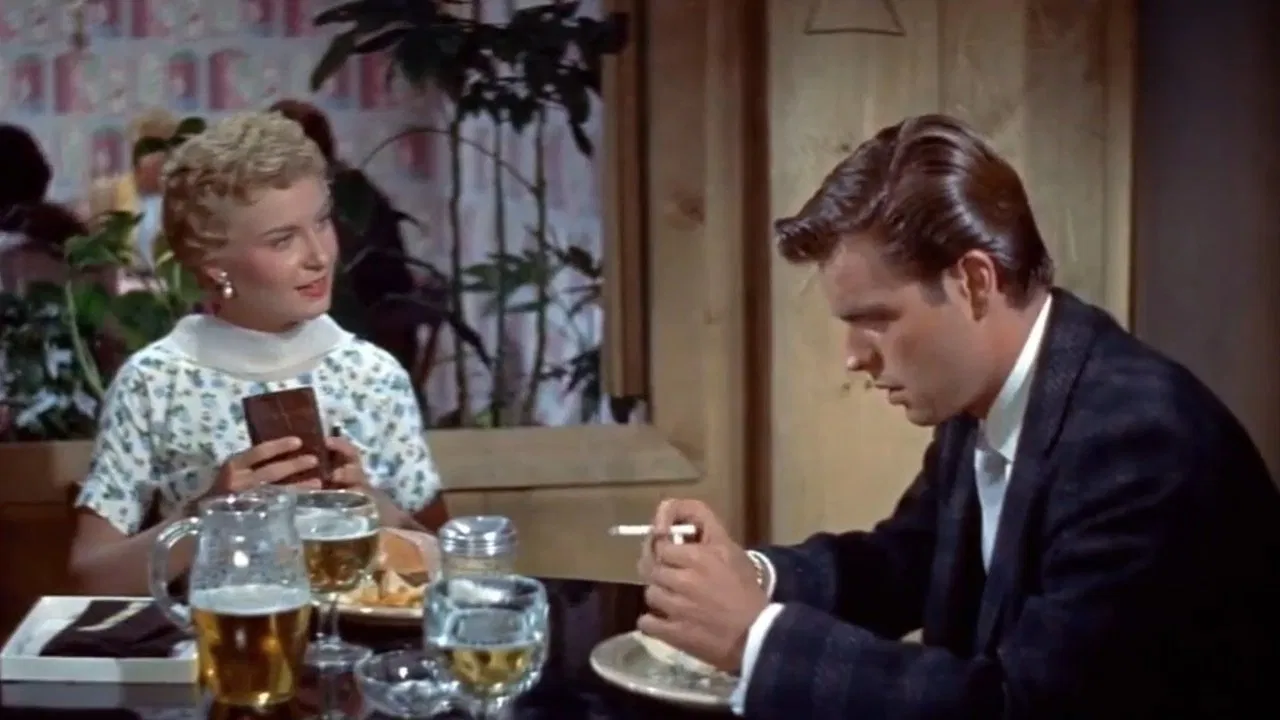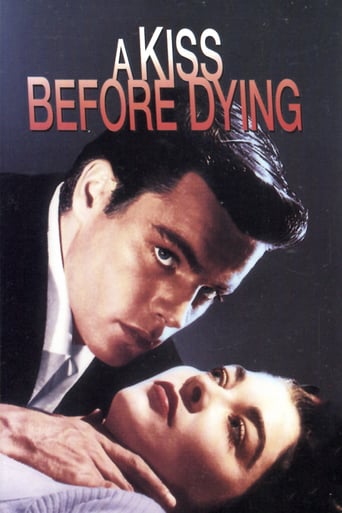SpuffyWeb
Sadly Over-hyped
Tetrady
not as good as all the hype
Brenda
The plot isn't so bad, but the pace of storytelling is too slow which makes people bored. Certain moments are so obvious and unnecessary for the main plot. I would've fast-forwarded those moments if it was an online streaming. The ending looks like implying a sequel, not sure if this movie will get one
Jenni Devyn
Worth seeing just to witness how winsome it is.
rodrig58
I wanted to see a young Joanne Woodward and an older Mary Astor. Both two great actresses. But Joanne does not have a big role, she's killed before the half
of the movie. And Mary has a small role, she's the mother of the character played by Robert Wagner. Which never was a favorite of mine, but he's a good actor. Here too he performs well the role of the disturbed criminal. A pleasure to see Virginia Leith, from "The Brain That Would not Die", very sexy in swimsuit beside the pool. Another nice surprise to see George Macready, from "Gilda", in the role of the father. The film it's not great, just watchable.
calvinnme
This is not your average 50's noir. Instead we have a low-down manipulative killer (Robert Wagner as Bud) set against the leafy backdrop of a college campus instead of the usual grimy cheapjack one. And from the clothes and cars down to the shotgun wedding ethic, it practically screams mid 1950s. Mary Astor is Bud's predatory mother who wants her son to marry into wealth and social position, and Joanne Woodward is Dorie, Bud's sweet and naive girlfriend who believes he really loves her and wants to marry her. But Dorie gets pregnant and dad is the unforgiving type, and Bud is afraid Dorie will be disinherited and Bud will become just another schlemiel working his way through college with a wife and baby in tow with no dough. Thus since Bud actually is in love with Dorie's dad's fortune, Dorie must go, and I don't mean to another college. But Bud is careful. He is clever and makes Dorie's death look like a suicide - poor girl never saw it coming. And since Bud has learned so much about Dorie's sister, Ellen, from Dorie, that is his next romantic stop. But like so many killers, Bud has overlooked some things. For one thing Dorie wrote Ellen right before her "suicide" saying that she had met somebody and was very happy. Thus Ellen is just not buying the suicide angle and goes looking for the truth, even though the killer is now her boyfriend! How will all of this work out? Watch and find out. George McReady is Dorie's and Ellen's rich father who is willing to believe the worst of anybody, especially his own children, and he is great as always. I recommend this one if it ever comes your way.
Robert J. Maxwell
Robert Wagner, a handsome and clever young student at an Arizona university, takes up with desperately lonely and prodigiously mousy Joanne Woodward. She's the daughter of George Macready, who is filthy rich. But the feckless Woodward becomes pregnant, which doesn't auger well for the couple's being blessed by straight-laced Dad. That is, if she gets knocked up and elopes in violation of the norms of the rich, she's disenfranchised.So Wagner sensibly takes his adoring girl friend to the Marriage License Bureau and then, finding the office closed for lunch, guides her to the roof and flings her off.If at first you don't succeed, try, try again, they say, so Wagner, oozing a sleazy charm, pitches woo at Macready's OTHER young daughter, Virginia Leith, and courts her properly.Leith, though, suspects that her sister's death is murder, not the suicide it appears to be. She seeks out one of Woodward's former beaux. He is sympathetic and is about to give Leith the identity of another of Woodward's boyfriends, namely Wagner himself, but Wagner shoots him dead and plants a suicide note on him.Meanwhile, in the background of all these machinations, detective Jeffrey Hunter is prowling around trying to uncover the truth. Finally he settles on Wagner. At the end, standing on the lip of a deep mining pit, Leith has determined that Wagner is the guilty party because she catches him in a not-quite inculpating fib. She accuses him. He confesses instead of sticking to his story. She doesn't believe him. So he tries to throw HER off the cliff -- but she's rescued at the last minute by Hunter and Macready, and Wagner falls to his well-deserved doom.It's a pretty decent murder story with no outstanding elements except Wagner's character. "Psychopath" was a much overused term a generation or two ago, so the shrink industry has tried to refine it, going through "sociopath" to the current "anti-social personality," which doesn't quite fit the template of a psychopathic personality. These are guys (mostly) who have no moral qualms, who think only about themselves, experience no anxiety except the most shallow, and don't know the meaning of the word remorse. Wagner's character is close to perfect, at least in the area of using his good looks, charm, and pheromones for pecuniary purposes.His performance is adequate, as always, and perhaps better than that. The use of that boyish smile to get him out of tight spots contrasts nicely with his self-interested blank when he's alone. Ditto for the other principals. Macready's facial and vocal default position is icy disdain. When he talks in his sleep it sounds haughty. Now, when he actually tries to PROJECT icy disdain, he comes across like Alice's Red Queen. Virginia Leith is attractive and elegant and can't act. The sound is tinny and the photography has the flat values of a television movie.The direction by Gerd Oswald is functional and avoids some of the usual clichés. Two examples: (1) Wagner, all smiles, wants to coax something out of his loving mother so he invites her to choose the tie he's going to wear today. When she gives him what he wants and then leaves, his smile disappears and he matter-of-factly replaces the tie she's picked with another of his own choosing. (2) Wagner walks up to a face mirror, the camera shooting over his shoulder, and grooms himself -- and the mirror is NOT set at an oblique angle, so we do NOT see Wagner's face staring directly at the audience. I wanted to applaud, but then it occurred to me -- unless -- unless -- is Gerd Oswald such a newbie, such a clumsy and innocent tyro, that he's unaware of the cliché and just hasn't THOUGHT of it? Lord, I hope not. I hope he thought it through and came out the other side. At the same time, I can't help imagining what Hitchcock would have done with Ira Levin's plot. In superficial ways it resembles "Psycho" and is reminiscent of "Shadow of a Doubt."Robert Wagner is a nice guy. To his friends he's "R.J." He was my supporting player in the superlative and unjustly vilified miniseries "Windmills of the Gods." Oh, I tried to teach the kid a few thespian tricks but I never really got the chance because the closest I came to him was brushing shoulders. What a long resume he has. George Macready, too, had a long and fruitful career on the screen, always more or less the same character, but we need those kinds of actors. It's reassuring to see them. They're fixed points in a changing and baffling universe.
christopher-underwood
Quite a surprise this as I picked the DVD up very cheaply half expecting something noirish. The credits come on and the bright colours and twinkling music suggest romantic comedy, then after briefly looking like another West Side Story, the music is working up a spell and the sensational use of cinemascope and the beautiful colour that was 'DeLuxe' has me spellbound. Not an inappropriate word that here either, 'spellbound', because there is more than a little Hitchcock here. The swirling romantic/menacing music and the boyish charm of the oh so confident, too determined, Bud Corliss, played very well by Robert Wagner. 'I'm twenty-five, Mum' he implores, and he was. Well paced, good looking and if the thrills are few, there is a fine momentum maintained.

